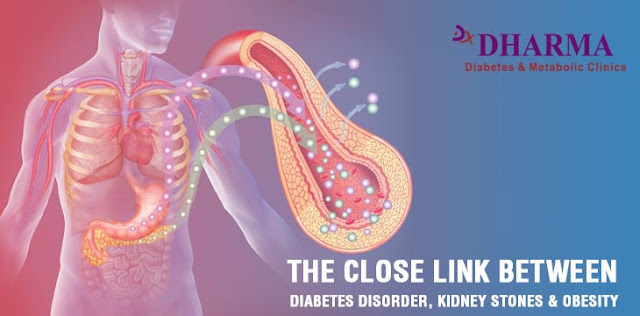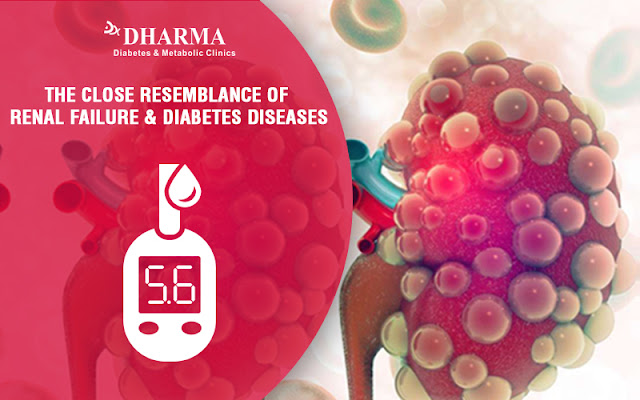The Close Link Between Diabetes Disorder, Kidney Stones & Obesity
Diabetes is an ailment in which the body doesn’t
produce sufficient insulin or can’t use it accurately. Insulin is vital
for regulating blood sugar levels and high blood sugar can produce
problems in any part of the body, including the kidneys. Those who are
suffering from type 2 diabetes, may also reveal urine which may be very
acidic. This increases the risk of developing kidney stones.
High blood pressure and diabetes are the principal reasons for kidney disease, basically by transforming the large and small blood vessels and causing anatomical and working differences in the kidney. The backbone of treatment is good control of blood sugar, blood pressure, and cholesterol, as well as the use of a class of medicine called angiotensin-converting enzyme inhibitors (ACE-I) or angiotensin receptor blockers (ARB) at the efficiency of the treating physician, and lifestyle alterations. There is a lot of investigation underway gazing at new treatments, particularly to reverse kidney injury due to diabetes, however, these are not in clinical use yet.
Diabetes may also cause injury to nerves in the body which can lead to difficulty in emptying of the bladder. The stress emerging from sufferer full bladder can back up and damage the kidneys. Not only that the urine can stay back in the bladder for a long period end in the growth of infection.
If you are diabetic, you should have your blood, urine and blood pressure monitored most concisely once a year. This will guide to better control of the disease and early operation of high blood pressure and kidney disease. Keeping control of the diabetes condition can reduce the risk of incurring severe kidney disease.
The most important problem is that somebody who is overweight tends to have more salt and animal protein in their diet, and this urges them to stone formation. As per the studies conducted at the Johns Hopkins University, it reveals that obesity in general nearly doubles the risk of forming kidney stones, but the point of obesity does not seem to improve or reduce the risk one way or the other.
Content Source : https://www.dharmadiabetesclinics.com/blog/the-close-link-between-diabetes-disorder-kidney-stones-obesity/
High blood pressure and diabetes are the principal reasons for kidney disease, basically by transforming the large and small blood vessels and causing anatomical and working differences in the kidney. The backbone of treatment is good control of blood sugar, blood pressure, and cholesterol, as well as the use of a class of medicine called angiotensin-converting enzyme inhibitors (ACE-I) or angiotensin receptor blockers (ARB) at the efficiency of the treating physician, and lifestyle alterations. There is a lot of investigation underway gazing at new treatments, particularly to reverse kidney injury due to diabetes, however, these are not in clinical use yet.
What Does Diabetes Disorder Do To The Kidneys?
With diabetes, the tiny blood vessels in the body are damaged. When the blood veins in the kidneys are damaged, the kidneys cannot purify the blood accurately. Moreover, the body retains more water and salt than it should, which can end in weight accumulation and joint inflammation. The sufferer may have protein in his urine waste materials which starts building up in the blood.Diabetes may also cause injury to nerves in the body which can lead to difficulty in emptying of the bladder. The stress emerging from sufferer full bladder can back up and damage the kidneys. Not only that the urine can stay back in the bladder for a long period end in the growth of infection.
Indication Of Kidney Disease In Patients With Diabetes Disorder
The most immediate sign of diabetic kidney disease is the increased elimination of albumin in the urine. This is present long before the general tests are done in the doctor’s office exhibiting indication of kidney disease, so you need to have this test every year. Weight accumulation and ankle inflammation may occur. urinating is more prevalently used in the night. The blood pressure may become too high.If you are diabetic, you should have your blood, urine and blood pressure monitored most concisely once a year. This will guide to better control of the disease and early operation of high blood pressure and kidney disease. Keeping control of the diabetes condition can reduce the risk of incurring severe kidney disease.
What Are Kidney Stones?
Kidney stones develop when you have high densities of certain elements in the urine. Generally, most of the kidney stones are formed due to excess calcium oxalate whereas others are formed because of struvite, uric acid, or cystine. The nature of the stones allows it to travel from the kidney to the urinary tract. Small stones may pass through your body and out in your urine with little or no pain.How Obesity Plays A Role In Kidney Stone Development?
Obesity strikes a very big role in kidney stone development and is connected with insulin resistance and compensatory hyperinsulinemia, metabolic imbalances that may lead to the formation of calcium-containing kidney stones. Hyperinsulinemia may add to the addition of calcium stones by encouraging the urinary excretion of calcium. More extensive body size may also end in increased urinary excretion of uric acid and oxalate, risk factors for calcium oxalate kidney stones.The most important problem is that somebody who is overweight tends to have more salt and animal protein in their diet, and this urges them to stone formation. As per the studies conducted at the Johns Hopkins University, it reveals that obesity in general nearly doubles the risk of forming kidney stones, but the point of obesity does not seem to improve or reduce the risk one way or the other.
Reference
Individuals suffering from diabetes are vulnerable to number of diseases and need to take specific care to maintain their blood sugar level. You can meet Dr. Mudit Sabharwal, the best diabetes doctor in Delhi, he can guide you with medication and nutrition required during this phase.Content Source : https://www.dharmadiabetesclinics.com/blog/the-close-link-between-diabetes-disorder-kidney-stones-obesity/




Comments
Post a Comment